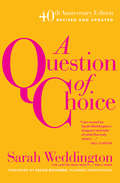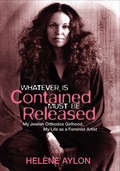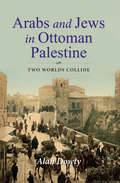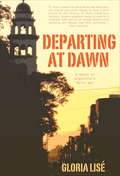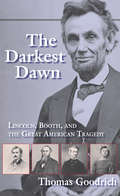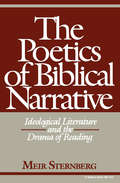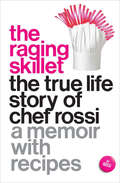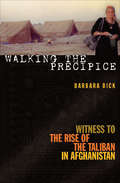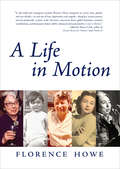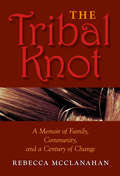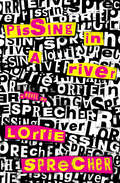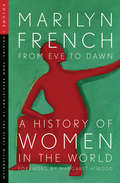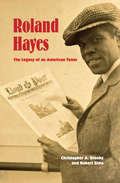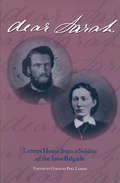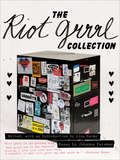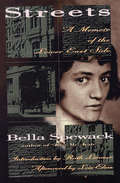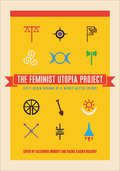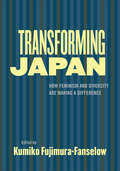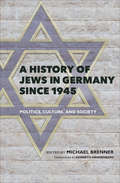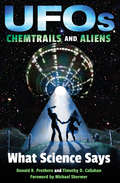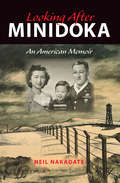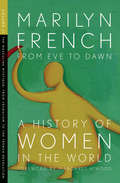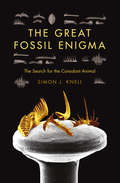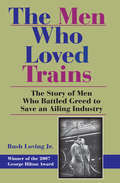- Table View
- List View
A Question of Choice: Roe V. Wade 40th Anniversary Edition
by Sarah WeddingtonA memoir filled with &“valuable, passionate insights&” from the lawyer who argued the landmark Roe v. Wade case to the Supreme Court (Kirkus Reviews). More than 40 years ago, the highest court in the land handed down a decision that would forever alter the lives of women throughout the United States. Roe v. Wade became the seminal lawsuit that gave American women the legal right to abortion. Weddington, just 27 years old in 1973, became a key figure in the reproductive rights movement when she took on the case. Here she recounts her remarkable story, from her personal experience with abortion and the workforce discrimination she faced in her early career to the judicial proceedings and long journey she has undertaken in fighting for women&’s rights since. As divisive as ever, the famous decision is continually threatened by organized pro-life groups. Weddington compels &“those who are willing to share the responsibility of protecting choice,&” to follow her plan of action in supporting the legal rights of women. A Question of Choice is an &“eloquent reminder of what Roe truly means—that our most private decisions can be made behind the closed doors of our homes, with our families, and in private conversations with our hearts&” (Former President Bill Clinton).
Whatever Is Contained Must Be Released: My Jewish Orthodox Girlhood, My Life as a Feminist Artist (Jewish Women Writers Ser.)
by Helène Aylon&‘[A] richly evocative, captivating, and reflective memoir&” of a feminist artist who broke free of the limits placed on her by family, Judaism and society (Publishers Weekly). Growing up an Orthodox Jew in Brooklyn, Helene Aylon spent her Friday nights in a sea of extended family as the Sabbath candles flickered. Passionate about art, she dreamt of escaping the strict, secular world of her youth, but instead married a rabbi and became a mother of two. Then, her world was split apart when her husband was diagnosed with cancer, and Aylon found herself widowed at thirty. Free to explore both her own soul and the changing world around her, Aylon sought a home in the burgeoning environmental art scene of the 1970s—creating transgressive works that explore identity, women&’s bodies, the environment, disarmament, and the notion of God. Finally, she dares to asks of Judaism: Where are the women? With many examples of her work included within, Whatever is Contained &”is an arresting tale of uncommon courage, intelligence, and wit&” following Aylon&’s search for truth in art, and the links between feminism and Judaism (Gail Levin, author of Lee Krasner: A Biography and Becoming Judy Chicago).
Arabs and Jews in Ottoman Palestine: Two Worlds Collide (Perspectives On Israel Studies)
by Alan DowtyThe historian and expert on Israeli-Palestinian relations offers &“a well-written, well-balanced&” account of cultural conflicts in the region before WWI (Anita Shapira, author of Israel: A History).When did the Arab-Israeli conflict begin? Some discussions focus on the 1967 war, some go back to the creation of the state of Israel in 1948, and others look to the beginning of the British Mandate in 1922. Alan Dowty, however, traces the earliest roots of the conflict to the Ottoman Empire in the 19th century, arguing that this historical approach highlights constant clashes between religious and ethnic groups in Palestine. Dowty demonstrates that, during the 19th century, there was an overwhelming hostility to European foreigners, and that Arab residents viewed new Jewish settlers as European. He also shows that Jewish settlers had tremendous incentive to minimize all obstacles to settlement, including the inconvenient hostility of the existing population. Dowty's thorough research reveals how events that occurred over 125 years ago shaped the implacable conflict that dominates the Middle East today.
Departing at Dawn: A Novel of Argentina's Dirty War
by Gloria Lisé&“[A] quiet, powerful novel&” of a young woman caught in the chaos of Argentina in the mid-1970s, when speaking against the government could mean death (Publishers Weekly). March 23, 1976. Berta watches horrified as her lover, a union organizer named Atilio, is thrown from a window to his death by soldiers. The next day, Colonel Jorge Rafael Videla stages a coup d&’état and a military dictatorship takes control of Argentina. And even though she was never a part of Atilio&’s union efforts, Berta is on a list to be &“disappeared.&” Fleeing to relatives in the countryside, she becomes part of the family she knows only from old photographs: Aunt Avelina, who blasts music from an old record player; Uncle Nepomuceno, who watches slugs slither in the garden every afternoon; and Uncle Javier, who sits in his tiny grocery store day and night. But soon enough, Berta realizes she must run even further to save her life—and those she has come to love. With a prose that is light yet penetrating, Gloria Lisé has written &“a beautifully simple, poetic story of solidarity and love, with memorable characters painted in the tender strokes of a watercolor&” (Luisa Valenzuela, author of Black Novel with Argentines).
The Darkest Dawn: Lincoln, Booth, and the Great American Tragedy
by Thomas GoodrichThe story of the Lincoln assassination and its aftermath, captured with you-are-there immediacy. It was one of the most tragic events in American history: The famous president, beloved by many, reviled by some, murdered while viewing a play at Ford&’s Theater in Washington. The frantic search for the perpetrators. The nation in mourning. The solemn funeral train. The conspirators brought to justice. Coming just days after the surrender of the Confederate Army at Appomattox, the assassination of Abraham Lincoln has become etched in the national consciousness like few other events. The president who had steered the nation through its bloodiest crisis was cut down before the end, just as it appeared that the bloodshed was over. The story has been told many times, but rarely with the immediacy of The Darkest Dawn. Thomas Goodrich brings to his narrative the care of the historian and the flair of the fiction writer. The result is a gripping account, filled with detail and as fresh as today&’s news. &“Among the hundreds of books published about the assassination of our 16th president, this is an exceptional volume.&” —Frank J. Williams, founding Chair of The Lincoln Forum
The Poetics of Biblical Narrative: Ideological Literature and the Drama of Reading (Indiana Studies In Biblical Literature Ser. #No.453)
by Meir SternbergMeir Sternberg&’s classic study is &“an important book for those who seek to take the Bible seriously as a literary work.&” (Adele Berlin, Prooftexts) In &“a book to read and then reread&” (Modern Language Review), Meir Sternberg &“has accomplished an enormous task, enriching our understanding of the theoretical basis of Biblical narrative and giving us insight into a remarkable number of particular texts.&” (Journal of the American Academy of Religion). The result is a &“a brilliant work&” (Choice) distinguished &“both for his comprehensiveness and for the clearly-avowed faith stance from which he understands and interprets the strategies of the biblical narratives.&” (Theological Studies). The Poetics of Biblical Narrative shows, in Adele Berlin&’s words, &“more clearly and emphatically than any book I know, that the Bible is a serious literary work―a text manifesting a highly sophisticated and successful narrative poetics.&”
The Raging Skillet: The True Life Story of Chef Rossi: A Memoir with Recipes
by Rossi&“[A] juicy memoir about growing up, becoming a chef, and working as New York&’s most unconventional wedding caterer.&” —BUST magazine When their high-school-aged, punk, runaway daughter is found hosting a Jersey Shore hotel party, Rossi&’s parents feel they have no other choice: they ship her off to live with a Chasidic rabbi in Crown Heights, Brooklyn. Within the confines of this restrictive culture, Rossi&’s big city dreams take root. Once she makes her way to Manhattan, Rossi&’s passion for cooking, which first began as a revolt against the microwave, becomes her life mission. The Raging Skillet is one woman&’s story of cooking her way through some of the most unlikely kitchens in New York City—at a &“beach&” in Tribeca, an East Village supper club, and a makeshift grill at Ground Zero in the days immediately following 9/11. Forever writing her own rules, Rossi ends up becoming the owner of one of the most sought-after catering companies in the city. This heartfelt, gritty, and hilarious memoir shows us how the creativity of the kitchen allows us to give a nod to where we come from, while simultaneously expressing everything that we are. This &“moving, witty memoir&” (Nigella Lawson) includes unpretentious recipes for real people everywhere. &“A humorous and witty chronicle of a woman&’s pulling-herself-up-by-her-bootstraps rise through the culinary ranks.&” —Kirkus Reviews
Walking the Precipice: Witness to the Rise of the Taliban in Afghanistan
by Barbara BickAn &“enthralling&” memoir of a woman who risked her life to help a people under siege and a country caught between freedom and oppression (Publishers Weekly—starred review). In 1990, sixty-five-year-old activist and grandmother Barbara Bick traveled with a women&’s delegation to Afghanistan for what she thought would be her last great adventure. Instead, Bick forged deep friendships with her Afghan hosts—only to watch in horror as the Taliban took over most of the country and instituted fiercely anti-woman policies. Eleven years later, at age 76, Bick returned to Afghanistan, travelling to the region controlled by the Northern Alliance, an anti-Taliban militia. In early September 2001, Bick walked out of a compound where militia leader Ahmad Shah Massoud was also staying. Minutes later, Taliban infiltrators assassinated Massoud—a prelude to the al Qaeda attacks on the United States. As the US government became deeply involved in Afghanistan, Bick decided to return once again to see how women were faring under the new government. In 2004, she was one of the few Western women able to bring years of experience to understanding the country&’s trauma. Walking the Precipice gives new insight into the people, politics, and culture of a country that is on everyone&’s radar—for its beauty, and for its tragic place history.
A Life in Motion (Jewish Women Writers Ser.)
by Florence Howe&“A sharp and compelling memoir&” of a feminist icon who forged positive change for herself, for women everywhere, and for the world (Rosemary G. Feal, executive director of the Modern Language Association). Florence Howe has led an audacious life: she created a freedom school during the civil rights movement, refused to bow to academic heavyweights who were opposed to sharing power with women, established women&’s studies programs across the country during the early years of the second wave of the feminist movement, and founded a feminist publishing house at a time when books for and about women were a rarity. Sustained by her relationships with iconic writers like Grace Paley, Tillie Olsen, and Marilyn French, Howe traveled the world as an emissary for women&’s empowerment, never ceasing in her personal struggle for parity and absolute freedom for all women. Howe&’s &“long-awaited memoir&” spans her ninety years of personal struggle and professional triumphs in &“a tale told with startling honesty by one of the founding figures of the US feminist movement, giving us the treasures of a history that might otherwise have been lost&” (Meena Alexander, author of Fault Lines).
Dream Homes: From Cairo to Katrina, an Exile's Journey (Jewish Women Writers Ser.)
by Joyce ZonanaThe American daughter of Egyptian Jewish immigrants journeys in search of belonging from Brazil to New Orleans and beyond—includes recipes and photos! Born to Egyptian Sephardic Jews who fled to the United States after the Arab-Israeli war of 1948, Joyce Zonana spent her childhood in Brooklyn. But her experience of Jewish culture was very different from that of the other children she knew, from the foods they ate to the language they spoke. As she struggled to find a sense of inclusion, never feeling completely American or completely Egyptian, a childhood trip to Brazil became the basis for a lifelong quest to find her place in the world. Meeting members of her extended family who had migrated to Brazil was one step in discovering the kind of life she might have lived in Egypt, and exploring the woman she was becoming. Through travels that ranged from Cairo to Oklahoma and finally New Orleans in the shadow of Katrina, and including an evocative exploration of the way food varies from culture to culture, this is a &“frank, spirited memoir of identity from a Brooklyn-raised, Egyptian-born Jewish feminist.&” (Kirkus Reviews) &“Zonana makes every human encounter lively&” —Booklist
The Tribal Knot: A Memoir of Family, Community, and a Century of Change (Break Away Book Club Edition)
by Rebecca McClanahanThe Pushcart Prize-winning author&’s multi-generational memoir interweaves stories across more than a century in a &“loving reminder of the ties that bind&” (Lee Martin, From Our House and Turning Bones). Are we responsible for, and to, those forces that have formed us—our families, friends, and communities? Where do we leave off and others begin? In The Tribal Knot, award-winning poet and author Rebecca McClanahan mines her personal family history to explore provocative questions about legacy, identity, and familial connection. Poring over letters, artifacts, and documents that span more than a century, McClanahan discovers a tribe of hardscrabble Midwest farmers, hunters, trappers, and laborers struggling to hold tight to the ties that bind them, through poverty, war, political upheavals, illness and accident, filicide and suicide, economic depressions, personal crises, and global disasters. Like the practitioners of Victorian "hair art" who wove strands of family members' hair into a single design, McClanahan braids her ancestors' stories into a single intimate narrative of her search to understand herself and her place in the family's complex past.
Pissing in a River: A Novel
by Lorrie Sprecher&“An honest and genuine DIY punk-rock lesbian love story.&” —Kirkus Reviews Amanda moves to London with nothing but her guitar and her collection of punk music as the soundtrack to her every move. With the company of a few friendly voices in her head, she looks for—and finds—a best friend and new lover. She forms a band, Lesbian Raincoat, and completely rewrites the story of her life. In this irreverently funny yet profound novel, Amanda risks deportation, recalls the fervor of AIDS activism in the United States, connects to the class struggle of punk, and finds redemption in love. But she also must confront her own mental illness, her lover&’s rape, and the violence of post-9/11 politics. Pissing in a River captures the glee and turbulence of surviving the cacophony of modern life. &“A love letter to the obsessions that captivated an outcast generation: punk, politics, passion, and provocation.&” —Maria Raha, author of Cinderella&’s Big Score: Women of the Punk and Indie Underground
From Eve to Dawn: From Prehistory to the First Millennium (Origins #1)
by Marilyn FrenchThe first volume of the New York Times–bestselling author&’s monumental and unprecedented history: &“Consistently thought-provoking&” (The New York Review of Books). The internationally celebrated author of The Women&’s Room, Marilyn French spent over fifteen years with a team of researchers and prominent historians examining women&’s lives and activities in civilizations and societies spanning the ages. Beginning in prehistory, Origins moves on to examine women&’s lives in ancient Egypt, China, India, Peru, Mexico, Greece, and Rome. In her reconstruction of wars, laws, and other activities affecting both women and men, French also traces the worldviews underpinning them. She also depicts how women&’s relationship to Judaism, Christianity, and Islam changed for good and bad over the centuries. &“She backs up even her more controversial theories with an impressive accumulation of academically accepted historical, anthropological and sociological sources . . . Written in concise, understated language, this is a significant addition to literature on women&’s studies and history.&” —Publishers Weekly
Roland Hayes: The Legacy of an American Tenor
by Robert Sims Christopher A. BrooksA &“gripping, sensitive&” biography of the trailblazing singer who carved a path for African American artists including Marian Anderson and Paul Robeson (The Atlanta Voice). Performing in a country rife with racism and segregation, the tenor Roland Hayes was the first African American man to reach international fame as a concert performer. He became one of the few artists in the world who could sell out Town Hall, Carnegie Hall, Symphony Hall, and Covent Garden. Performing the African American spirituals he was raised on, his voice was marked with a unique sonority which easily navigated French, German, and Italian art songs. A multiculturalist both on and off the stage, he counted among his friends George Washington Carver, Eleanor Roosevelt, Ezra Pound, Pearl Buck, Dwight Eisenhower, and Langston Hughes. This &“substantial and well-documented&” biography spans the history of Hayes&’s life and career and the legacy he left behind as a musician and a champion of African American rights (BBC Music Magazine). It is an authentic, panoramic portrait of a man who was as complex as the music he performed. &“Like many generations of celebrated African American concert artists, I am an inheritor of the legacy left by the great Roland Hayes. Yet, we hardly know his name today. With this long overdue book, the oversight is now remedied.&” —Lawrence Brownlee, Metropolitan Opera &“A wonderful journey through Hayes&’ performances, racial plight and acceptance.&” —Examiner.com
Dear Sarah: Letters Home from a Soldier of the Iron Brigade
by Coralou Peel LassenAn epistolary portrait of the life and times of a Civil War soldier and family man as he transformed from simple Michigan country boy to seasoned fighter. Cpl. John H. Pardington, a member of the 24th Michigan Infantry of the famous Iron Brigade, was an articulate and observant soldier. The 80 letters collected in this volume are filled with patriotic dedication to the Union cause, longing for his wife and baby, details of camp life, and reflections on the Battle of Fredericksburg, the Battle of Chancellorsville, and other engagements. Their intimacy and warmth are made even more poignant by the knowledge that Pardington will be killed at the Battle of Gettysburg. Pardington reveals the stresses of war and comments on the heroics of everyday life, whether at home or on the battlefield. In messages to his sister and father-in-law, he shares his opinions of President Lincoln and the changing leadership of the Army of the Potomac, as well as his hopes for the outcome of the war. Full of wisdom and insight, this collection draws back the curtains on an ordinary life during the most extraordinary of times.
The Riot Grrrl Collection
by Johanna FatemanArchival material from the 1990s underground movement &“preserves a vital history of feminism&” (Ann Cvetkovich, author of Depression: A Public Feeling). For the past two decades, young women (and men) have found their way to feminism through Riot Grrrl. Against the backdrop of the culture wars and before the rise of the Internet or desktop publishing, the zine and music culture of the Riot Grrrl movement empowered young women across the country to speak out against sexism and oppression, creating a powerful new force of liberation and unity within and outside of the women&’s movement. While feminist bands like Bikini Kill and Bratmobile fought for their place in a male-dominated punk scene, their members and fans developed an extensive DIY network of activism and support. The Riot Grrrl Collection reproduces a sampling of the original zines, posters, and printed matter for the first time since their initial distribution in the 1980s and &’90s, and includes an original essay by Johanna Fateman and an introduction by Lisa Darms.
Streets: A Memoir of the Lower East Side (The\helen Rose Scheuer Jewish Women's Ser.)
by Bella Spewack&“A startling, clear-eyed&” memoir of an immigrant girl&’s childhood in early 20th century NYC from the journalist and Tony-winning co-author of Kiss Me Kate (Booklist). Born in Transylvania in 1899, Bella Spewack arrived on the streets of New York&’s Lower East Side when she was three. At twenty-two, while working as a reporter with her husband in Europe, she wrote a memoir of her childhood that was never published. More than seventy years later, the publication of Streets recovers a remarkable voice and offers a vivid chronicle of a lost world. Bella, who went on to a brilliant career write for stage and screen with her husband Sam, describes the sights, sounds, and characters of urban Jewish immigrant life after the turn of the century. Witty, street-smart, and unsentimental, Bella was a genuine American heroine who displays in this memoir &“a triumph of will and spirit&” (The Jewish Week).
The Feminist Utopia Project: Fifty-Seven Visions of a Wildly Better Future
by Edited by Alexandra Brodsky and Rachel Kauder NalebuffThis &“incredible addition to the feminist canon&” brings together the most inspiring, creative, and courageous voices concerning modern women&’s issues (Jessica Valenti, editor of Yes Means Yes). In this groundbreaking collection, more than fifty cutting-edge feminist writers—including Melissa Harris-Perry, Janet Mock, Sheila Heti, and Mia McKenzie—invite us to imagine a world of freedom and equality in which: An abortion provider reinvents birth control . . . The economy values domestic work . . . A teenage rock band dreams up a new way to make music . . . The Constitution is re-written with women&’s rights at the fore . . . The standard for good sex is raised with a woman&’s pleasure in mind . . . The Feminist Utopia Project challenges the status quo that accepts inequality and violence as a given, &“offering playful, earnest, challenging, and hopeful versions of our collective future in the form of creative nonfiction, fiction, visual art, poetry, and more&” (Library Journal).
Transforming Japan: How Feminism and Diversity Are Making a Difference
by Kumiko Fujimura-FanselowA volume of essays by Japan&’s leading female scholars and activists exploring their country&’s recent progressive cultural shift. When the feminist movement finally arrived in Japan in the 1990s, no one could have foreseen the wide-ranging changes it would bring to the country. Nearly every aspect of contemporary life has been impacted, from marital status to workplace equality, education, politics, and sexuality. Now more than ever, the Japanese myth of a homogenous population living within traditional gender roles is being challenged. The LGBTQ population is coming out of the closet, ever-present minorities are mobilizing for change, single mothers are a growing population, and women are becoming political leaders. In Transforming Japan, Kumiko Fujimura-Fanselow has gathered the most comprehensive collection of essays written by Japanese educators and researchers on the ways in which present-day Japan confronts issues of gender, sexuality, race, discrimination, power, and human rights.
A History of Jews in Germany Since 1945: Politics, Culture, and Society
by Michael BrennerA comprehensive account of Jewish life in a country that carries the legacy of being at the epicenter of the Holocaust. Originally published in German in 2012, this comprehensive history of Jewish life in postwar Germany provides a systematic account of Jews and Judaism from the Holocaust to the early 21st Century by leading experts of modern German-Jewish history. Beginning in the immediate postwar period with a large concentration of Eastern European Holocaust survivors stranded in Germany, the book follows Jews during the relative quiet period of the 50s and early 60s during which the foundations of new Jewish life were laid. Brenner&’s volume goes on to address the rise of anti-Israel sentiments after the Six Day War as well as the beginnings of a critical confrontation with Germany&’s Nazi past in the late 60s and early 70s, noting the relatively small numbers of Jews living in Germany up to the 90s. The contributors argue that these Jews were a powerful symbolic presence in German society and sent a meaningful signal to the rest of the world that Jewish life was possible again in Germany after the Holocaust. &“This volume, which illuminates a multi-faceted panorama of Jewish life after 1945, will remain the authoritative reading on the subject for the time to come.&” —Frankfurter Allgemeine Zeitung &“An eminently readable work of history that addresses an important gap in the scholarship and will appeal to specialists and interested lay readers alike.&” —Reading Religion &“Comprehensive, meticulously researched, and beautifully translated.&” —CHOICE
UFOs, Chemtrails, and Aliens: What Science Says
by Donald R. Prothero Timothy D. CallahanA wide-ranging survey offers &“entertainment as well as wisdom for everyone who&’s ever wondered what&’s behind so many conspiracy theories and paranormal phenomena&” (Publishers Weekly). UFOs. Aliens. Strange crop circles. Giant figures scratched in the desert surface along the coast of Peru. The amazing alignment of the pyramids. Strange lines of clouds in the sky. The paranormal is alive and well in the American cultural landscape. In UFOs, Chemtrails, and Aliens, Donald R. Prothero and Tim Callahan explore why such demonstrably false beliefs thrive despite decades of education and scientific debunking. Employing the ground rules of science and the standards of scientific evidence, Prothero and Callahan discuss a wide range of topics including the reliability of eyewitness testimony, psychological research into why people want to believe in aliens and UFOs, and the role conspiratorial thinking plays in UFO culture. They examine a variety of UFO sightings and describe the standards of evidence used to determine whether UFOs are actual alien spacecraft. Finally, they consider our views of aliens and the strong cultural signals that provide the shapes and behaviors of these beings. While their approach is firmly based in science, Prothero and Callahan also share their personal experiences of Area 51, Roswell, and other legendary sites, creating a narrative that is sure to engross both skeptics and believers.
Looking After Minidoka: An American Memoir (Break Away Bks.)
by Neil NakadateA &“clear-eyed, carefully researched but nonetheless passionate book&” that is &“rich with the closely observed details of internment camp life&” (Lauren Kessler, author of Stubborn Twig: Three Generations in the Life of a Japanese American Family). During World War II, 110,000 Japanese Americans were removed from their homes and incarcerated by the US government. In Looking After Minidoka, the &“internment camp&” years become a prism for understanding three generations of Japanese-American life, from immigration to the end of the twentieth century. Nakadate blends history, poetry, rescued memory, and family stories in an American narrative of hope and disappointment, language and education, employment and social standing, prejudice and pain, communal values and personal dreams. &“Poetic yet sharply honest, the family story unfolds within the larger context of the national saga. You&’ll wince but read it anyway. Your soul will be better for it.&” —Nuvo &“This book is highly readable and contains fascinating details not usually covered in other books on Japanese-American history.&” —Oregon Historical Quarterly
From Eve to Dawn: The Masculine Mystique from Feudalism to the French Revolution (Origins #2)
by Marilyn French&“Filled with fascinating detail . . . this second volume of French&’s massive and valuable work is an example of scholarship and clear vision.&” —Publishers Weekly This volume of New York Times–bestselling author Marilyn French&’s monumental history analyzes and evaluates the lives of women in societies around the world between feudal times and the French Revolution. Drawing upon fifteen years of collaboration with a team of researchers and prominent historians, the volume opens with fascinating chapters comparing medieval Europe and Japan, disparate cultures which nevertheless shared traditions of male dominated aggression and competitiveness. French then shows how, in Europe, this tradition led to colonialism and imperialism, and the horrific subjugation of indigenous societies, just as women were subjugated in the conquerors&’ home countries. As French makes clear in this impassioned women&’s history, only with the French Revolution did the political force women exerted powerfully change the course of history. &“French gives us grand theory at its best, wading through copious amounts of scholarly data on the histories of civilizations and offering up, in readable prose, an important synthesis.&” —Library Journal
The Great Fossil Enigma: The Search for the Conodont Animal (Life of the Past)
by Simon J. KnellA fascinating, comprehensive, accessible account of conodont fossils—one of paleontology&’s greatest mysteries: &“Deserves to be widely read and enjoyed&” (Priscum). Stephen Jay Gould borrowed from Winston Churchill when he described the eel-like conodont animal as a riddle wrapped in a mystery inside an enigma. The search for its identity confounded scientists for more than a century. Some thought it a slug, others a fish, a worm, a plant, even a primitive ancestor of ourselves. As the list of possibilities grew, an answer to the riddle never seemed any nearer. Would the animal that left behind the miniscule fossils known as conodonts ever be identified? Three times the creature was found, but each was quite different from the others. Were any of them really the one? Simon J. Knell takes the reader on a journey through 150 years of scientific thinking, imagining, and arguing. Slowly the animal begins to reveal traces of itself: its lifestyle, its remarkable evolution, its witnessing of great catastrophes, its movements over the surface of the planet, and finally its anatomy. Today the conodont animal remains perhaps the most disputed creature in the zoological world.
The Men Who Loved Trains: The Story of Men Who Battled Greed to Save an Ailing Industry (Railroads Past and Present)
by Rush Loving Jr.An award-winning account of a crisis in railroad history: &“This absorbing book takes you on an entertaining ride.&” —Chicago Tribune A saga about one of the oldest and most romantic enterprises in the land—America&’s railroads—The Men Who Loved Trains introduces the chieftains who have run the railroads, both those who set about grabbing power and big salaries for themselves, and others who truly loved the industry. As a journalist and associate editor of Fortune magazine who covered the demise of Penn Central and the creation of Conrail, Rush Loving often had a front-row seat to the foibles and follies of this group of men. He uncovers intrigue, greed, lust for power, boardroom battles, and takeover wars and turns them into a page-turning story. He recounts how the chairman of CSX Corporation, who later became George W. Bush&’s Treasury secretary, managed to make millions for himself while his company drifted in chaos. Yet there were also those who loved trains and railroading—and who played key roles in reshaping transportation in the northeastern United States. This book will delight not only the rail fan, but anyone interested in American business and history. Includes photographs
